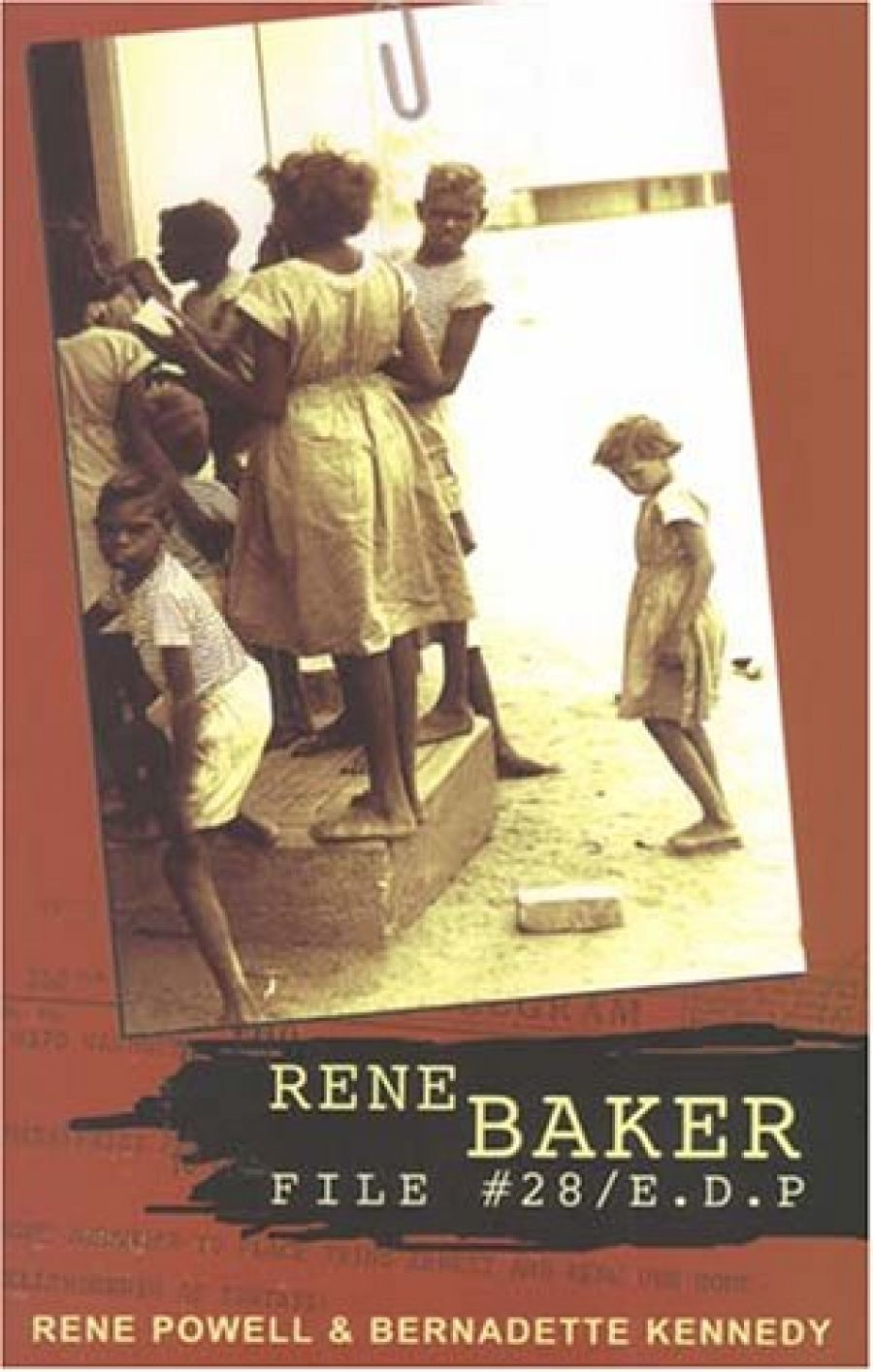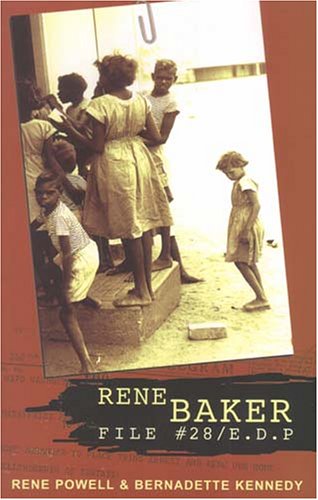
- Free Article: No
- Contents Category: Indigenous Studies
- Review Article: Yes
- Article Title: Whitefella stuff
- Online Only: No
- Custom Highlight Text:
Rene Baker File #28/E.D.P. is written by two women, Rene Powell and Bernadette Kennedy. Powell is an Aboriginal woman who was taken from her mother at the age of four. Kennedy, an ex-nun who is descended from Irish, English and Scottish migrants, has ‘worked with the homeless and disadvantaged in Western Australia’ for more than twenty-five years. The two women met through Kennedy’s religious work and because of Rene’s drinking problem: Rene was the first resident in a homeless women’s shelter that Kennedy helped to run.
- Book 1 Title: RENE BAKER FILE #28/E.D.P.
- Book 1 Biblio: FACP, $24.95 pb, 221 pp
- Book 1 Cover Small (400 x 600):

- Book 1 Cover (800 x 1200):

Ignoring the whiff of a power inequity between the co-authors, these bare facts may cause unease among those readers suspicious of the agendas of ‘religious types’ and of the history of the relationship between various churches and Aboriginal people. Others may wonder, as I did, how Kennedy’s involvement in the book would be ‘managed’. These are well-founded concerns, because of the church’s involvement in the removal of Aboriginal children from their families, and also because of the complex ethical issues involved in interracial collaborations.
By the book’s end, however, one feels relieved and overly cautious for harbouring such doubts. For a start, the relationship between the two women is marked by honesty and long-term friendship rather than by manipulation or exploitation. Secondly, these authors are savvy, quickly demonstrating their attunement to the politics of interracial collaboration. This awareness is evident as early as the preface, where Powell writes:
We were sitting in the kitchen having a cup of tea, just Bernadette and me. I was real wild and very upset, too, about those people who come out and say the Stolen Generations were rescued from the Aboriginal way of life … It was in that kitchen that I decided I wanted to tell my story. I was stolen from my mother. I asked Bernadette to help. We’re friends … First, she didn’t want to, but in the end we worked out a way to do it together.
This ‘way’ is unique, not least because Kennedy is white but also because Rene Baker File #28/E.D.P. is not a ‘life story’, a popular genre for indigenous writers in recent years. Rather, it is a searching examination of child removal and of the various lies and ‘truths’ that surround the practice. Thus, Rene’s account of being removed from her mother is juxtaposed with Kennedy’s analysis of the ‘whitefella stuff’ that contextualises, but does not justify, this removal. This encompasses the files that document the official version of Rene’s experience, a brave move given Rene’s feeling that these files, more than merely representing her, are ‘her’. Her courage bears fruit: it is fascinating to see the paperwork laid bare, and startling to realise how a few lines can change lives. Moreover, the result constitutes a sort of textual reversal of the policy of assimilation, for Rene’s personal recollections become the most powerful component of the story.
Exemplifying this, Rene’s description of returning to her people at the age of twenty-one is among the most moving I have read. Unusually, it comes early on in the book. In the life-writing genre, ‘homecoming’ tends to come towards the end, suggesting that it is the goal and ultimate destination of the narrator. Yet, as the historian Peter Read has written, for many stolen children, ‘return’ is often more likely to be experienced as another twist in a complex journey than as resolution. This seems to have been the case for Rene, who was unable to speak to her mother except through a translator. Some languages are universal, however, as evidenced when the adult Rene wakes to find her mother tenderly stroking her as she sleeps. As Phillip Noyce understood when he filmed the agonised shrieking of the Aboriginal mothers in Rabbit Proof Fence, loss cannot always be expressed in words.
The only problem with Rene relating her story so early is that, soon after this, she virtually disappears from the narrative and Kennedy’s more ‘objective’ examination dominates the text. Where the authors’ two voices worked harmoniously together, providing an intricate picture of Rene’s removal, Kennedy’s is less powerful on its own. Thus, when Kennedy asks herself ‘was there really a book here anyway?’, one cannot help but share her concern. The chapters in which she cobbles together various newspaper clippings from the war and assimilation eras are particularly unconvincing. In addition to reading like notes for a PhD thesis, they are confusingly labelled, and it is difficult to discern when the author is speaking and when she is using media quotations.
Upon Rene’s return, the text is revivified. The final chapters on negotiating and writing the book, and on Rene’s decision to move to her homeland, provide further evidence of Rene Baker File #28/E.D.P.’s greatest strength: its capacity to demonstrate the inherently social nature of all writing, whether interracial, collaborative or otherwise.


Comments powered by CComment